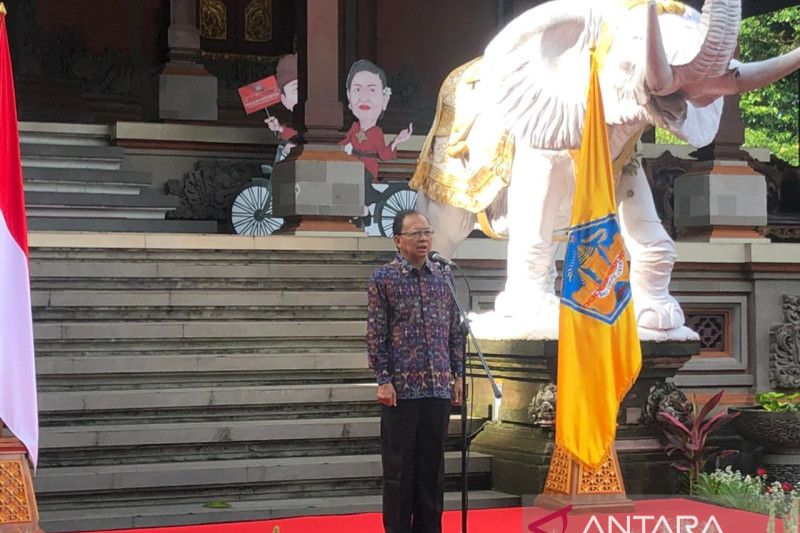
Bali Governor Wayan Koster echoes Bali's readiness to welcome G20 delegates for G20 Summit amid several flash floods that earlier occurred in the region in Denpasar, Friday, October 21, 2022. (ANTARA/Ni Putu Putri/rst)
The flood issue has been resolved, and it is safe nowBali Governor Wayan Koster affirmed that several natural disasters that occurred in Bali would not affect the implementation of the G20 Summit in November 2022.
"The flood issue has been resolved, and it is safe now. There will be no problem with the G20 Summit," he stated in Denpasar, Bali, Friday.
Koster ensured that the central government and the G20 delegation did not have to harbor concerns, as the condition in Bali was safe after several districts were hit by flash floods due to extreme weather.
The governor later noted that the regional government had handled the impact of the natural disasters in several districts, such as building a temporary evacuation place for residents in Jembrana District.
"Food for refugees has also been prepared. In the long term, 20 families in Jembrana District will be relocated. The land has been prepared by the Bali Provincial Government," Koster stated.
The governor noted that the 20 families were relocated, as their houses were prone of flash floods that often occurred, with the worst case occurring on October 17 when flash floods hit the districts of Jembrana, Tabanan, and Karangasem that resulted in some casualties.
"Their houses were located under the road, and it was not safe. We have made preparations with the Bali Regional Disaster Mitigation Agency (BNPB) to help them. Bali is safe for the G20 Summit. There is no need to worry," he emphasized.
Earlier, the Bali Environmental Forum (WALHI) on Tuesday (October 18) also highlighted the construction of the Gilimanuk-Mengwi Toll Road infrastructure, which was said to use 480.54 hectares of rice fields.
The impact of the conversion of agricultural land could damage a natural hydrological irrigation system that can keep the volume of water from upstream to downstream and accelerate flooding in the area.
"The conversion of land has resulted in climate change and an increase in the earth's surface temperature, resulting in an increase in heavy rainfall in various locations. Hence, there is a high potential of floods and landslides occurring in various areas in Bali," Director of WALHI Bali, Made Krisna Dinata, stated.
In response to this, Koster explained that not many rice fields would be used for the construction of the Mengwi-Gilimanuk Toll Road. He also ensured that the construction had been calculated carefully.
"The rice fields are not large, only 200 hectares, if I am not mistaken, but the economic value of the entire area will increase. The construction will not cause a disaster. This has been calculated, and the area is not an upstream area, this is a transverse area. It will be different if the construction is carried out upstream, as it can be dangerous," he noted.
Related news: Indonesia forges intelligence cooperation ahead of G20 Summit
Related news: TNI Commander prepares 18,030 joint personnel to secure G20 Summit
Related news: G20 momentum to show Bali's disaster risk preparedness: Official


















